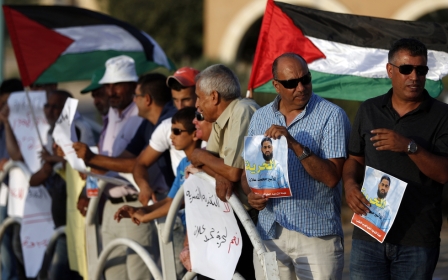Israel court lifts detention order against Palestinian hunger striker

Israel's High Court on Wednesday suspended a detention-without-trial order on hunger-striking Palestinian prisoner Mohammed Allan but said he must remain in hospital pending a decision on his future.
"Due to the petitioner's medical condition he will remain in intensive care," said the ruling, seen by AFP.
"This means that for now, owing to the hunger striker's medical condition, the administrative detention order is no longer operative."
The case of Allan, 31, whose two-month hunger strike has put his life at risk, has put intense pressure on Israeli authorities, who have detained him without charge since November and who fear that his death in Israeli custody could further fan the flames of Palestinian unrest.
Allan regained consciousness on Tuesday after being in a coma for several days, but pledged to resume fasting if Israel did not resolve his case within 24 hours.
While he was unconscious doctors gave him fluids, vitamins and minerals by intravenous drip.
Earlier Wednesday, the head of the hospital where he is being treated told a televised news conference he appeared to have suffered brain damage.
"During the course of the day, Mohammed gradually began to lose coherent contact with his surroundings, he didn't talk sense... which could indicate a problem in his brain," Chezy Levy, director of Barzelai hospital, in the southern Israeli city of Ashkelon said.
"The damage could be reversible."
The court said that for now he should be treated like other hospital patients.
"His family and friends will be able to visit him, not as a prisoner, subject to the usual medical instructions on visiting the sick," the ruling said.
"After his condition stabilises, if Allan asks to be moved to another hospital he is to apply to the authorities and in the case of difficulty or disagreement it will be possible to turn to the court," it added.
Allan has been held in what is known as administrative detention, which allows for internment without charge for six-month intervals that can be renewed indefinitely.
His lawyers argue his condition negates Israeli authorities' claim that he poses a security risk.
Israeli authorities use administrative detention to hold Palestinians they deem to be security risks while not divulging what the authorities view as sensitive intelligence.
The measure has also been used against Jewish extremists, though in far fewer instances.
Militant movement Islamic Jihad describes Allan, a lawyer from the West Bank, as a member, as does Israel.
Some 340 Palestinians are currently held in administrative detention, and detainees have regularly gone onhunger strike to protest.
Escalating violence
On Sunday, Palestinian citizens of Israel and their supporters clashed with Israeli police near the hospital treating the hunger striking prisoner.
Police said they arrested more than 10 people, including Palestinians from east Jerusalem, for throwing stones at officers and disrupting public order in the southern city of Ashkelon where Allan is being treated.
Palestinians had planned to stage a rally outside Barzilai hospital in Ashkelon, but Jewish right-wing activists confronted them, chanting racist slogans and saying they hoped Allan died.
The clashes continued as officers began removing the Palestinians to the city's entrance to prevent further confrontations with the Jewish protesters.
Furthermore, tensions have soared in the Israeli-occupied West Bank in recent weeks in the wake of the firebombing of a Palestinian home in the village of Duma, attributed to Jewish hardliners, which killed an 18-month-old child and his father.
Israeli opposition leader Isaac Herzog who met Palestinian leader Mahmoud Abbas warned on Tuesday of the dangers of another intifada (uprising) unless the two sides resume a long-frozen peace negotiations.
There are fears that the violence will escalate if Allan dies from his hunger strike.
New MEE newsletter: Jerusalem Dispatch
Sign up to get the latest insights and analysis on Israel-Palestine, alongside Turkey Unpacked and other MEE newsletters
Middle East Eye delivers independent and unrivalled coverage and analysis of the Middle East, North Africa and beyond. To learn more about republishing this content and the associated fees, please fill out this form. More about MEE can be found here.



